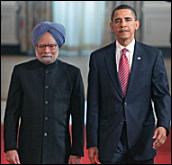 A joint statement released today by President Obama and Prime Minister Singh of India announced a new planned cooperation between the United States and India. Long on aspiration and short on details, the statement says that the two countries have agreed to “transform bilateral export control regulations and policies to realize the full potential of the strategic partnership between the two countries.”
A joint statement released today by President Obama and Prime Minister Singh of India announced a new planned cooperation between the United States and India. Long on aspiration and short on details, the statement says that the two countries have agreed to “transform bilateral export control regulations and policies to realize the full potential of the strategic partnership between the two countries.”
The part of the proposal that has attracted the most attention, particularly in the Indian press, is the agreement to remove some or all of the Indian companies and agencies currently on the Entity List maintained by the Bureau of Industry and Security (“BIS”). Currently, the Entity List, which adds special license requirements for most exports to the designated entities, covers Bharat Dynamics Limited, three subordinate agencies in the Defense Research and Development Organization, four subordinate agencies of the Indian Space Research Organization, and two components of the Department of Atomic Energy as well as all nuclear reactors not under International Atomic Energy Agency safeguards.
The language in the joint statement relating to these entities is somewhat ambiguous:
[T]he two leaders decided to take mutual steps to expand U.S. – India cooperation in civil space, defense, and other high-technology sectors. Commensurate with India’s nonproliferation record and commitment to abide by multilateral export control standards, these steps include the United States removing Indian entities from the U.S. Department of Commerce’s “Entity List†and realignment of India in U.S. export control regulations.
Notice the statement does not say that “all” Indian entities will be removed from the Entity List. Because the focus of the statement is on cooperation in “space, defense, and other high-technology sectors,” there is a good possibility that every Indian entity except the two listed Department of Atomic Energy components and the unsafeguarded nuclear reactors will be removed.
It is also not clear what is meant by the “realignment of India in U.S. export control regulations.” Perhaps India might be removed from Country Group D and promoted to a more-favored group. Maybe the Country Chart will be amended to change the reasons for control applicable to India. Or maybe licensing officers at BIS will be directed to think five nice thoughts about India each day.
Finally, the joint statement indicates that the U.S. will support India’s membership in four multilateral export control regimes — Nuclear Suppliers Group, Missile Technology Control Regime, Australia Group, and Wassenaar Arrangement. Of course, India will first have to adopt the controls required for those regimes, something it has so far not done.


 Posted by
Posted by  Category:
Category: 

 The story of the unlicensed export of epoxy paint by PPG to the Pakistan Atomic Energy Commission carries on. This blog
The story of the unlicensed export of epoxy paint by PPG to the Pakistan Atomic Energy Commission carries on. This blog  A
A 

